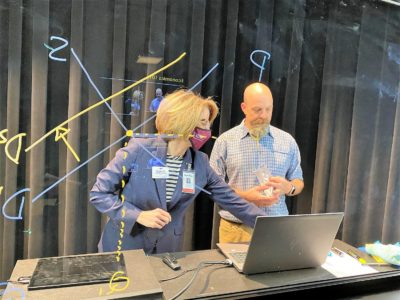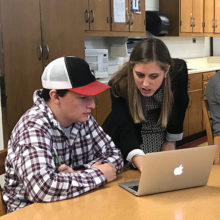
|
|
This is the last piece in a five-part series on adult learners at North Carolina’s community colleges. Click here to read the rest of the series.
In the last decade, Tennessee has risen to national prominence for its efforts to increase postsecondary attainment. Under former Gov. Bill Haslam, Tennessee set a goal to increase the share of Tennesseans who hold a postsecondary credential from 32% in 2013 to 55% by 2025. As of 2019, Tennessee’s attainment rate had increased almost 15 percentage points to 46.8%, according to Lumina Foundation.
Two efforts have been central to their success so far: Tennessee Promise and Tennessee Reconnect. Tennessee Promise is a last-dollar scholarship for high school graduates to attend technical or community college. According to their 2021 annual report, Tennessee Promise has enrolled almost 108,000 students in college and paid over $129 million in college costs since its inception in 2015.
Tennessee Reconnect is a last-dollar grant for adults to attend technical or community college. According to their 2020 annual report, 41,832 adults applied for the Tennessee Reconnect grant and 18,217 enrolled in college and received the grant in its first year.
The success of Tennessee Reconnect has caught the attention of postsecondary leaders in North Carolina as they begin a pilot project, called NC Reconnect, to attract adult learners to enroll in community college this fall. Categorized as students over the age of 25, adult learners often have different needs, backgrounds, and goals than students entering college right out of high school, and colleges are learning to shift their communications, operations, and advising to reflect that.
Recently, I had the chance to talk with Dr. Kenyatta Lovett, former executive director of Complete Tennessee and a nationally recognized expert on postsecondary education and workforce development, about what North Carolina can learn from Tennessee’s experience with adult learners through Tennessee Reconnect.
The following conversation has been edited for length and clarity. For more on adult learners, read the rest of our series here.
Molly Osborne: What were the biggest barriers you saw in getting adults to go to college and earn a credential or degree?
Kenyatta Lovett: I’d say the first and low-hanging fruit would be the adults with some college or some relevant experience but no degree. How do you take what they’ve already earned and articulate that into college credit so they can really understand the pathway forward?
Number two: One of the issues that has been extremely difficult is the recruitment streams and recruitment strategies are built for high school to higher ed connections, and so you don’t necessarily have a student-centered approach to recruitment and advising that looks at adults. So what we found with the Tennessee Reconnect communities was this beautiful opportunity where adults, in a non-intimidating way, could go and talk to an adviser and have multiple conversations before making a choice of going back to college. As one of my friends who is a registrar would say, when an adult goes back to college, the entire family goes back to college.
This was one that was institution agnostic. You go to some place in the community, maybe it’s at the library, you have several conversations, you figure out what’s the right pathway for you based on what you want to do, what your hours are, what institutions are available. [You need] good recruitment and advising onboarding streams that are comprehensive and very well structured.
Texas A&M is doing a study right now on how many interactions are necessary for an adult to enroll, and they’re at a total of 62 interactions before they can make that enrollment certain. That’s a pretty high number.
The third one really centers on how do we bring work and higher ed together so that you know they’re not having to look at a fork in the road of do I forego work to go to college or vice versa. So how do you bring apprenticeships, work-based learning models, and those types of programs, as an adult strategy to make sure that, one, they may actually earn a higher wage than they’re making now or they can stop working two jobs and just work one, but that work experience should be integrated with the education and training experience so they can get through faster [and] they have a pipeline into the career they want to get into.
MO: What are some of your takeaways from your work in Tennessee around how to address these challenges?
KL: First one is that the adult attainment strategy has to be a community-driven approach, not that it’s not necessarily that way for traditional-age students, but it has to really be a community-level approach to ensure that adults have the supports to go to college. I’d say the other thing, the employer is probably one of the most critical levers in being supportive of adults getting through the pipeline.
I’d say on the policy side, I don’t think there’s a lot that needs to take place in policy, only because if you use the existing resources that are out there and you can change the focus of what you’re doing as an institution or a system, you can be a lot more supportive of adults using braided funding or other types of strategies.
I think the last thing I’ll say I’ve learned that’s not so good is that there is an unstated stigma towards supporting adults in comparison to traditional-age students. In certain pockets of Tennessee, it really had us scratching our heads because no one would really clearly state it, but the way it felt was for an 18 year-old, they got a chance in life. For these adults, if they’ve made a mistake, I don’t know why they get support. We’ve got to address that.
MO: What are some concrete steps that colleges should take if they are trying to figure out how to better support adult learners?
KL: Nashville State has the Reconnect Cafe, which we helped to get off the ground. Definitely environments and support systems for adults to find a sense of community on campus, a community college campus, is important, and that’s not that heavy of an investment. I think that would be really, really supportive and the word gets out among adults that this is a place you can go.
The other one is that community colleges should really take advantage of any of the federal funding that students can need and is available to them — SNAP, EBT, TANF. When a community college takes those on, or at least opens up space at their campus for those services to be provided, it goes a really long way.
I’d say the last one, that’s probably right along those lines, is going back to work experiences and having opportunities. Long story, but the president of the University of Memphis had gone to three different restaurants within two days and noticed that he was served by the same waiter who also was a student at the University of Memphis. He realized this is to pay for tuition, for books, and for rent, and his thought was maybe we can put some work experiences on the campus and give them time to be close to class.
So, the university foundation formed a corporation, and they began to contract out tech support, call support services, and began working with FedEx and a couple of other big corporations. They were employees of those corporations but their office was on campus. They saw huge gains in retention and success. A lot of those individuals could stop working three jobs because the wage paid enough.
Shanna Jackson at Nashville State loved the idea, and Columbia State did as well, so Tractor Supply, because they had some office space at the campus, put some offices there so that students could work for Tractor Supply on the IT side and they would be close to campus, close to the library, and all the other amenities that come with the campus. Putting work experiences at the campus in partnership with employers can go a really, really long way in making sure adults have everything that they need that they’re not so busy working and drive time — don’t even get me started on bus routes and transit routes and what that takes. Lowering the transaction costs for the student at the campus level for all the things they have to deal with is a good option.
MO: Is there anything else you feel is really important for people working with adult learners to think about?
KL: If they don’t look at braided funding, it’s never going to work. I think the braided funding approach is the most efficient way to do it. You also need a comprehensive front on the onboarding and recruitment side. Instead of making an adult go through 50 doors to get one tangible thing that they need, have it all in one place, or two. That then leads into the braided funding approach. Once you go through those doors, hey, by the way, you qualify for SNAP, you qualify for TANF, there’s an adult scholarship program, you name it.
It is worthy for municipalities to dig in to look at what are the disincentives in terms of transit line structures that keep adults from even considering college. Access — the campus may be in a place where there’s no bus route, you name it. I think we found out in Memphis it was two hours to go for a 10 mile ride because of all the transfers, so there are ways in which I think city mayors, city councils can really think through that.
The other thing I’ll say is that there’s a two [generation] opportunity as well, so what are our K through 12 districts doing to also create those onboarding ramps? It’s not easy for an adult to go back to college.
For more on Tennessee’s work with adult learners, listen to this podcast with Mike Krause, former head of Tennessee’s Higher Education Commission.
Recommended reading




